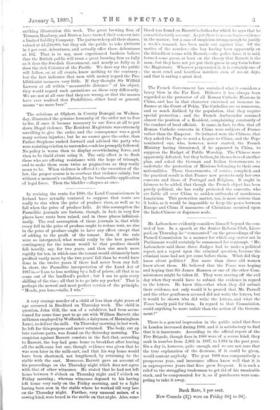In revising the rents for 1889, the Land Commissioners in
Ireland have actually ventured to suppose that rents are really to rise when the price of produce rises, as well as to fall when the price of produce falls. At this assumption the Parnellite journals are furious, though, in fact, in very few places have rents been raised, and in those places infinitesi- mally. The real assumption of these journals is, that while every fall in the price of produce ought to reduce rent, no rise in the price of produce ought to have any effect except that of adding to the profit of the tenant. Now, if the rule were so interpreted, what would really be the best possible contingency for the tenant would be that produce should fall heavily, say, for two years, and then rise much more rapidly for ten, in which case the tenant would ultimately have profited vastly more by the two years' fall than he would have done in the twelve years if there had never been any fall. In short, the Parnellite interpretation of the Land Act of 1887 am to lose nothing by a fall of prices; all that is to come out of the landlord's pocket but I am to gain every shilling of the rise ; all that is to go into my pocket.' That is perhaps the newest and most perfect version of the principle, "Reads, you lose,—tails, I win."














































 Previous page
Previous page